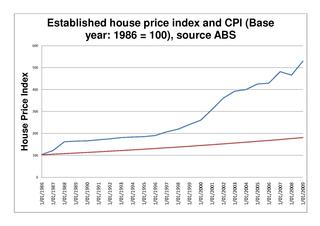Related Research Articles
A subsidy or government incentive is a form of financial aid or support extended to an economic sector generally with the aim of promoting economic and social policy. Although commonly extended from the government, the term subsidy can relate to any type of support – for example from NGOs or as implicit subsidies. Subsidies come in various forms including: direct and indirect.

Construction is a general term meaning the art and science to form objects, systems, or organizations, and comes from Latin constructio and Old French construction. To construct is the verb: the act of building, and the noun is construction: how something is built, the nature of its structure.
The Latham Report, titled Constructing the Team, was an influential report written by Sir Michael Latham, published in July 1994. Latham was commissioned by the United Kingdom government and industry organisations to review procurement and contractual arrangements in the UK construction industry, aiming to tackle controversial issues facing the industry during a period of lapse in growth as a whole.
The National Federation of Builders (NFB) is a United Kingdom trade association representing the interests of regional contractors and small and medium sized house builders in England and Wales.

Morgan Sindall Group plc is a leading British Construction & Regeneration group, headquartered in London employing around 6,700 employees and operating in the public, regulated and private sectors. It reports through six divisions of Construction & Infrastructure, Fit Out, Property Services, Partnership Housing, Urban Regeneration and Investments. It is listed on the London Stock Exchange and is a constituent of the FTSE 250 Index.
The Construction industry of India is an important indicator of the development as it creates investment opportunities across various related sectors. With a share of around 8.2%, the construction industry has contributed an estimated ₹670,778 crores to the national GDP at factor cost in 2011–12. The industry is fragmented, with a handful of major companies involved in the construction activities across all segments; medium-sized companies specializing in niche activities; and small and medium contractors who work on the subcontractor basis and carry out the work in the field. In 2011, there were slightly over 500 construction equipment manufacturing companies in all of India. The sector is labor-intensive and, including indirect jobs, provides employment to more than 49.5 million people. The construction sector is visualized to play a powerful role in economic growth, in addition to producing structures that adds to productivity and quality of life. economic development is a term that economics politician and other have used frequently in the 20th century, modernization westernization and specially industrialisation are other terms people have used while discussing economic development. economic development has a direct relationship with the environment. government undertaking to meet go abroad economic objectives such as price stability, high employment and sustainable growth, such efforts include financial and economic policies, regulations of financial industry trade and tax policies.

Retailing in India is one of the pillars of its economy and accounts for about 10 percent of its GDP. The Indian retail market is estimated to be US$ 600 billion and one of the top five retail markets in the world by economic value. India is one of the fastest growing retail markets in the world, with 1.2 billion people.

The Australian property bubble is the economic theory that the Australian property market has become or is becoming significantly overpriced and due for a significant downturn. Since the early 2010s, various commentators, including one Treasury official, have claimed the Australian property market is in a significant bubble.

The Construction Industry Training Board (CITB) is the industry training board for the UK construction industry.
Constructing Excellence is a United Kingdom construction industry membership organisation created in 2003, the only such which draws its member organisations from across the industry supply chain, ranging from clients, through contractors and consultants, to suppliers and manufacturers of building materials and components. Constructing Excellence attempts to apply the reforms recommended in the 1994 Latham and 1998 Egan Reports, having absorbed several bodies established following those reports. In August 2016, Constructing Excellence became part of BRE, but retains its identity and core purposes.
From January 2009 until September 2015, the UK Contractors Group (UKCG) was the primary association for construction contractors operating in the UK. In September 2015, it merged with the National Specialist Contractors Council to form Build UK.
Retainage is a portion of the agreed upon contract price deliberately withheld until the work is substantially complete to assure that contractor or subcontractor will satisfy its obligations and complete a construction project. A retention is money withheld by one party in a contract to act as security against incomplete or defective works. They have their origin in the British construction industry Railway Mania of the 1840s but are now common across the industry, featuring in the majority of construction contracts. A typical retention rate is 5% of which half is released at completion and half at the end of the defects liability period. There has been criticism of the practice for leading to uncertainty on payment dates, increasing tensions between parties and putting monies at risk in cases of insolvency. There have been several proposals to replace the practice with alternative systems.
Never Waste a Good Crisis, also known as the Wolstenholme Report, is a 2009 report written by Andrew Wolstenholme and commissioned by Constructing Excellence. Wolstenholme analysed the British construction industry's performance against the objectives set out in the 1998 Egan Report. His assessment was pessimistic, noting a failure to meet targets in almost all areas bar profitability. Wolstenholme outlined several problems prevalent in the industry and measures that might be taken to resolve them, calling on the industry to use the Great Recession as an opportunity to change its performance.
Transforming Infrastructure Performance is a British government report on the UK construction industry. Issued by the Infrastructure and Projects Authority in December 2017, its aim is to improve productivity in the sector and make savings of £15 billion per year. It proposes to do this by increasing innovations like off-site construction and new digital technology, improving government procurement procedures, and improving integration and collaboration. It is seen as a welcome initiative by the industry, and early implementation of its aims has been incorporated into the water industry's 2019 price review.
The Infrastructure Cost Review was a 2010 report commissioned by the government of the United Kingdom and written by Infrastructure UK to find efficiency savings in the delivery of infrastructure projects. The British government aimed to make savings of up to £3 billion per year on current expenditure by 2015, primarily in the pre-construction phase. The report made a series of recommendations for changes in government procurement and planning. Cost savings were quickly realised and Infrastructure UK reported savings of £1.5 billion at the end of the first reporting year and £3 billion by 2014. The programme was projected to have saved £50 billion in expenditure by the end of the 2010s. Infrastructure UK was absorbed into the Infrastructure and Projects Authority which launched its Transforming Infrastructure Performance in 2017 which aims to make £15 billion in annual savings.
Greg Fitzgerald is a British business executive. He has been chief executive officer of Bovis Homes since April 2017. Fitzgerald held the same position at Galliford Try from 2005 to 2015.
The Construction Skills Certification Scheme (CSCS) is a British company that runs a training and qualification verification scheme of the same name for the British construction industry. It is best known for providing the "CSCS card", a widely recognised smart card providing evidence of a level of health and safety training relevant to the industry. There are more than 1.6 million CSCS card holders. The scheme has recently moved away from providing cards to unqualified persons and is increasing the minimum level of qualification required to hold a card.
The Infrastructure Client Group (ICG) is an industry group for large infrastructure client organisations in the United Kingdom. It was founded as a collaboration between the Institution of Civil Engineers and the Infrastructure and Projects Authority to support the delivery of the British government's 2010 Infrastructure Cost Review. It has led initiatives to improve health and safety on site and improve the delivery of infrastructure.
Early contractor involvement (ECI) is a type of construction contract where the principal contractor is engaged at an early stage in a project to offer input into the design phase. It is in contrast to the design–bid–build model where the contractor is only brought onboard at the end of the design phase. The model allows the contractor to have an input in the design of the scheme and suggest value engineering changes. Studies have shown that savings of around 10% in construction phase time and 7% in cost are achievable through the use of ECI. The ECI model has become increasingly popular in the United Kingdom since the early 2000s and is also used in Australia and New Zealand.
References
- 1 2 3 Farmer, Mark (October 2016). "The Farmer Review of the UK Construction Labour Model" (PDF). UK Construction Leadership Council . Retrieved 12 December 2018.
- 1 2 3 4 5 6 "British construction must "modernise or die", says damning government report - News - GCR". Global Construction Review . Chartered Institute of Building. 18 October 2016. Retrieved 3 November 2018.
- 1 2 3 4 5 6 7 8 9 10 11 12 13 14 Wilson, Robyn (17 October 2016). "Farmer Review: Construction industry must 'Modernise or Die'". Construction News . Retrieved 3 November 2018.
- ↑ Peters, Nick (17 August 2018). "UK construction industry must 'Modernise or Die' - The Manufacturer". The Manufacturer . Retrieved 3 November 2018.
- ↑ "Farmer review: government response". Construction Index. 20 July 2017. Retrieved 3 November 2018.
- ↑ Prior, Grant. "Ministers reject client levy option in Farmer Review". www.constructionenquirer.com. Retrieved 5 November 2018.
- ↑ Whysall, David (25 July 2017). "There's only one way we can deliver Farmer's vision". Construction News. Retrieved 3 November 2018.
- ↑ Killeen, Steve (11 July 2018). "Steve Killeen: We have to end construction's boom and bust". NZ Herald. Retrieved 5 November 2018.
- ↑ "Leadership Council sets out procurement reform strategy". Construction Index. 11 July 2018. Retrieved 5 November 2018.